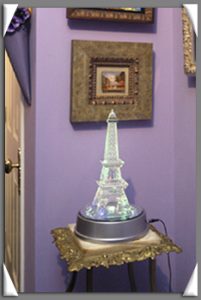One need only look at my voice-over studio to know that I am in love with Paris. The Eiffel Tower is my favorite thing in the world. I wear a gold Eiffel Tower charm on a bracelet, and I have numerous Eiffel Tower figurines in my house. The highlight (no pun intended) of my collection is a tall, lead crystal Eiffel Tower that sits on a lighted mirrored base. The base has colored LEDs, so the sparkling crystal shimmers in a rainbow of color as the base slowly turns.


Granted, the peddlers swarming beneath the Tower’s four lacy pillars wouldn’t know those things about me as Drew and I exited the Tower on a recent visit to Paris. They would only know that I had been up in the Tower, and they should have noticed that I was carrying a shopping bag. Since it was dark, they may have been unable to discern that the shopping bag was from the Eiffel Tower, indicating I had purchased souvenirs at the Tower gift shops.
Just like at the Great Pyramids, these people all rush up to you, shoving their wares in your face and shouting prices at you. In addition to the ever-popular Eiffel Tower key chains that we have seen (and bought) on previous trips, the new craze was hand-held, flashing, lighted Eiffel Towers. A girl who loves the Eiffel Tower as much as I do and already has 2 lighted crystal Eiffel Towers is a likely target market for such a thing. At the time, though, I was most interested in dinner since it was very late, and we had to get up early for our flight home.
The seller’s approach has everything to do with the prospect’s interest. People shouting prices at me just make me want to hurry along to get away from them, no matter how much I might like their item. As Will Newman points out in his excellent article in the Early to Rise e-zine, you often have to use the word because with appeals to your prospect’s emotions if you expect to make sales.
One of these flashing light vendors started walking with us. Like the guy at the Pyramids, I’ll give him points for trying to create rapport with us. He even attempted to follow Newman’s advice to play to our emotions, but he made a critical mistake.
Since this incident happened a few months ago, I have forgotten exactly what he said to me, but I responded that I already had one. Even though I liked the light, I was thinking I didn’t need to spend money on his light when I had the 2 splendid crystal versions awaiting me at home. I also just had stocked up on Eiffel Tower goodies inside the gift shops.
Did he appeal to my emotions in any way? Did he use humor and charm and say something like, ‘Two are better than one, especially for such a handsome couple! You each could have one then!’
Did this merchant explain the benefits of his product to me? Did he use quick thinking to generate a sale and propose that perhaps I’d like to purchase one as a special gift? Did he mention that the lights were exclusive items to the vendors outside and not carried by the Tower shops? (At least I didn’t see them inside the tiny, crowded little shops in the Tower.)
If he had ever suggested to either of us that we could buy this little light for me as reminder of our romantic nighttime visit to the twinkling Eiffel Tower, he probably would have made a sale. I DID like the flashing light, and he had engaged us in some form of conversation as we walked rather than simply shouting prices at us.
No, he employed a different tactic.
He argued with me.
When I told him that I had one, he said, ‘No you don’t!’ When I assured him that I do have one and had received it as a gift, he yelled at me, ‘YOU LIE!’
Okay, so I don’t have a lighted Eiffel Tower that looks and works exactly like the one he was selling. I think his light was something like a plastic flashlight, while my pieces are lead crystal and only light up when placed on top of the mirrored base. Apparently, street peddlers don’t study marketing tactics or read books by Dale Carnegie, but I would think even they should know that you don’t scream at potential prospects and call them liars.
When contacting potential clients about utilizing you as a voice-over talent, you should research them as thoroughly as possible before making the connection. Look at their web sites and read industry periodicals. The cold-call instantly becomes a warmer call when you already know something about the background and current needs of the person or organization. Practice your script, and be ready to tailor your responses depending on the recipient.
Understand that your first pitch to a potential voice-over client is probably not going to elicit a commitment on a project. You’re not trying to sell some little gadget on the street to someone you probably will never see again. You are a professional person who is introducing yourself and hoping to cast the initial rivets in the iron foundation of what will become a towering relationship among your clients. You usually have to make 5-7 contacts before the light even goes on in the prospect’s head that you are a voice-over artist.
Above all, have respect for everyone with whom you contact. You never know the source of that next job. What you put out in the Universe comes back to you. Would you rather spend your time in darkness, generating negative energy toward the prospect who turned you down, or in brightness, radiating positive energy to attract those clients who are looking for your vocal characteristics, your style of reads, your specialty niche and your value-added services?
If you always speak to and about prospects with deference to their needs, sometimes that first pitch will be all you need to forge a relationship of lasting beauty.

